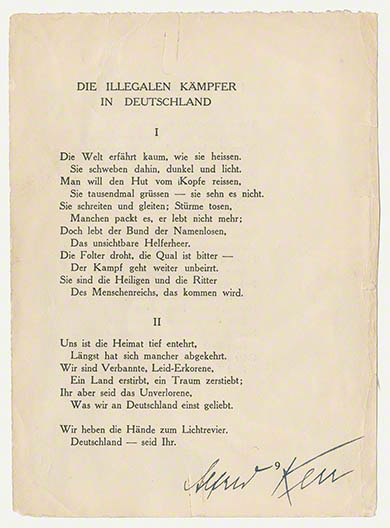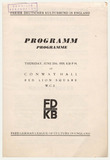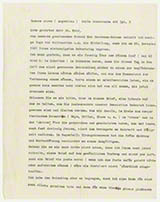Alfred Kerr: Page from the Melodien volume of poetry (1938)
Alfred Kerr: Page from the Melodien volume of poetry (1938)
Ich bin da auf die Erscheinung des Kritikerdichters zu sprechen gekommen, als die Kerr sich selbst oft bezeichnet hat. Das ist der Mensch, der aus Dichtung wieder Dichtung, gedichtete Kritik macht.
[I then mentioned the appearance of the 'critical poet', as Kerr often described himself. This is someone who makes poetry out of poetry - poetical criticism. (ed. trans.)]
Robert Musil, Heute spricht Alfred Kerr. Ein Porträt des berühmten Kritikers, 1928
In the poem Die illegalen Kämpfer in Deutschland, Alfred Kerr, who continued his flight in 1936 to Britain, struck an elegiac tone in honour of the resistance movement in Germany. He selected this page from his volume of poetry Melodien for an exhibition of the Freier Deutscher Kulturbund aimed at informing British citizens about the resistance in Germany. He also had it translated for the same reason. This and other poems were given the chapter heading "Fugue" in Melodien. This was because Kerr had composed his third book in exile in the form of a symphony. He called the first movement "Tutti" (all), the second "Solo". In this way he wove together themes relating to the developments in Germany and to his personal life. Psalm, Requiem and Funeral March were further headings. Labels such as "Vivace" (lively), "Allegro con fuoco" (lively with fire), and "Andante" (calm, slow) indicated how to read the texts and revealed something of the emotion with which they were written. He created rhymes in memory of deceased artists: Otto Brahm, Klabund, Herman Bang and Beethoven; he also created portraits of Max Herrmann-Neiße, Egon Erwin Kisch and Ernst Busch who had gone into exile like himself. Kerr also wrote about a Vormittag in Paris" ("Morning in Paris") in Melodien, that he had experienced as an emigrant in 1935: "So changeable is the weather now; / I ride through the city of the Seine / And read slowly and horrified / A newspaper on the omnibus." (Alfred Kerr, Die Diktatur des Hausknechts und Melodien, 1981, p. 172)




